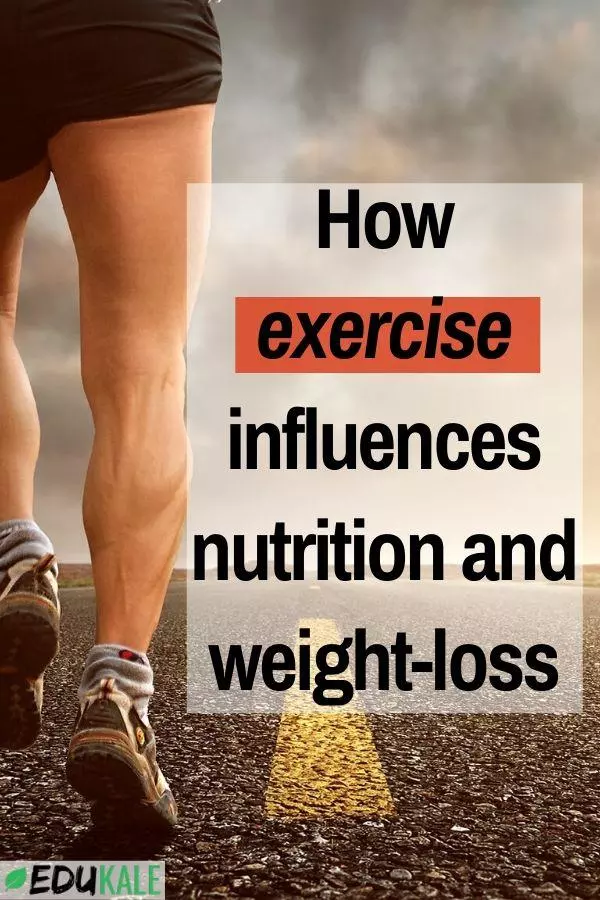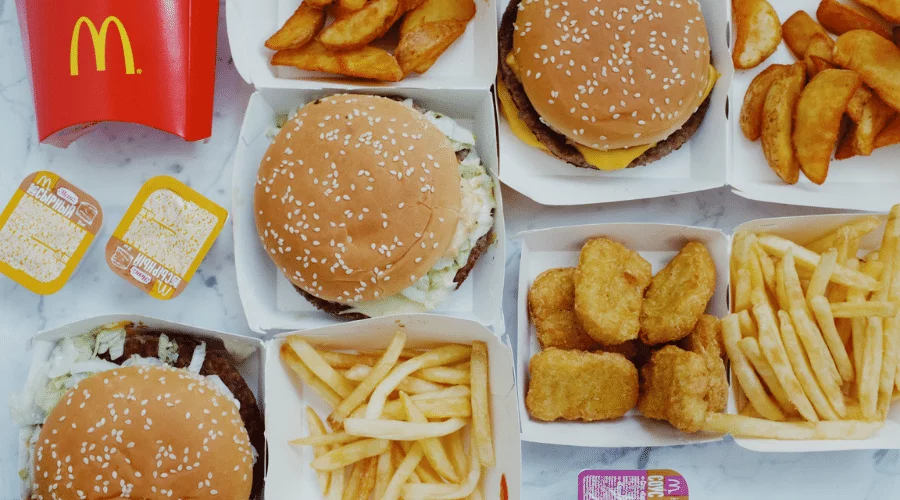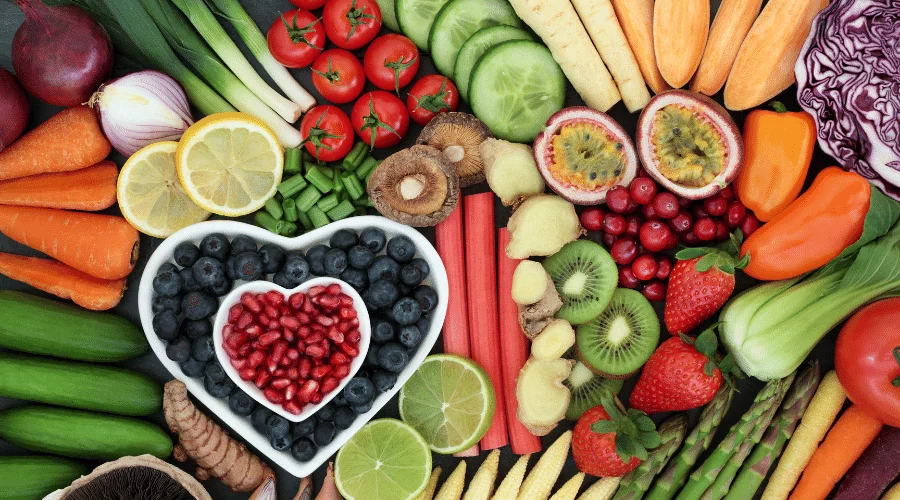This post contains affiliate links from which I may receive a small commission, at no extra cost to you. In no way does this affect my opinion or the information I provide on the product. Please read my disclaimer for more info.
Exercise and nutrition have always been grouped together as key components for a healthy lifestyle. In order to get the necessary nutrients and energy for your body, eating a healthy, balanced diet is crucial.
Regarding exercise, the benefits are aplenty: reducing your risk of diseases, improving your mood, health, sleep, and life expectancy, managing your weight… Here’s some insight into how you exercise influences your nutrition and your weight-loss.

Does exercise affect your food intake?
Ideas differ on whether or not the way you exercise will affect your nutrition.
It can cause you to eat less…
An idea people have is that someone who regularly exercises is probably also concerned about eating better and less. Therefore, this would lead to a decrease in food intake. There is actually little evidence for that: overall, it does not appear that physical activity has an impact on energy intake.
However, one study assessed the relationship between physical activity and diet quality in 222 young adults, and various parameters were evaluated. 67% of these individuals didn’t exercise and had a higher percentage of body fat. In general, active people consumed more grain and less fat. Their nutritional intake was closer to what was recommended, with higher intakes of micronutrients. Therefore, these results suggest that active people generally follow healthier diets, and have a more “adequate” fat content.
On the contrary, it can also be imagined that because physical activity uses energy, this increases your appetite, but there is not much convincing evidence supporting this. Actually, intense physical activity could even cause a brief hunger suppression in men, but in a non-lasting way, and without influencing their food intake. 1 In women, there isn’t any suppression of hunger following exercise, but their hunger doesn’t seem to grow, either. 2
Or eat more…
However, one study investigated whether people who exercised frequently compensated by eating more food. It consisted of having participants perform physical activity for 12 weeks. At the end, more than half of the participants hadn’t lost the amount of weight that should have come from spending this extra energy. This indicates that a kind of mechanism was in place to compensate for that predicted weight-loss. Theories included:
– increased hunger, leading to more food consumption
– tiredness, resulting in decreased activity throughout the “exercise-free” parts of the day
– metabolic adjustment
It was observed that neither the physical activity nor the metabolism had changed significantly, whereas there was a significant increase in hunger. This indicates that in general, when you perform physical activity, your system induces a compensatory response, mainly through increasing your food intake. Surprisingly, about 15% of the participants even gained weight during the 12 weeks of intervention, despite performing the exercises. They still, however, lost body fat. For some people, exercise is anabolic and leads to muscle development, which weighs more than fat.

So exercise can slightly affect nutrition, but what about its impact on weight-loss?
Does physical activity affect weight?
It has been proven that moderate-intensity exercise, between 150 and 250 minutes a week, prevents weight-gain and may result in some weight-loss. Exercising more frequently, approximately 250 min per week, is more efficient for weight-loss.
Several studies have explored how exercise affects weight-loss. It has been shown that significant weight-loss is unlikely to occur unless the physical activity is very intense or lasts for a long period of time. However, physical activity plays an important role in preventing weight-gain after initial weight-loss.
Furthermore, studies have shown that exercise alone does result in significant weight-loss. People had to exercise at either 600 kcal sessions, 400 kcal sessions, or not at all, and without modifying their diet, for 10 months. Both exercise groups resulted in weight-loss, while the group that didn’t exercise actually gained weight. Even though the weight-loss was minor (around 4-5kg), it shows that exercise plays a role in losing weight.
It’s also important to note that many people overestimate the energy spent on exercise and underestimate the energy value of food. This could be one of the reasons why exercise would not be an effective method of weight-loss for some people. 3
Overall, exercise complying with public health recommendations can encourage some weight-loss, but this varies greatly between individuals. You shouldn’t see physical activity as a real way to lose weight, and instead focus on the many health benefits that come from it. 4

Which type of exercise for weight-loss?
Most people think that it’s better to exercise longer at a lower intensity than to do a quick but intense workout for weight-loss.
A study was conducted to see the effect of different exercise intensities on energy intake. Men participated in three exercise sessions randomly, then free-willingly ate food from a buffet. Although they had exercised at different intensities, they all ate approximately the same quantity of food.
These results showed that there was no significant change in the subjective levels of post-exercise hunger, or in the total energy and macronutrient intakes. However, when taking into account the energy spent during the exercise, the high-intensity work-out had a more negative energy balance than the low-intensity work-out. In short, this questions the idea that a longer, low-intensity exercise is the best type of exercise to promote weight loss. If an increase in exercise intensity is compatible with your health and personal preferences, then it could be beneficial.
Nutrition or exercise for weight-loss?
In another study, the effects of physical activity and healthy eating were assessed among young Canadians. It showed that individuals thought physical activity was more important than healthy eating for weight loss. The pressure to exercise seemed to outweigh the importance of eating a balanced diet. People prioritized participating in sports over family meals, leading to the frequent consumption of fast-food on the go.
However, healthwise, it is rather contradictory to spend dinner time on the road going to activities which should be good for your health.
It therefore seems crucial to emphasize the importance of healthy eating instead of imposing physical activity at all costs. This can unintentionally support the fast-food industry for families in a hurry.
Although it is true that physical activity can promote weight loss, it often isn’t as much as expected. This is mainly due to the low doses of energy actually burnt off, combined with an increase in food intake. 5 Your general diet and nutrition habits actually account for 80% of weight-loss, so make sure to focus on that first.

The impact of exercise on nutrition and weight-loss in conclusion
Therefore, the effect of exercise on nutrition or food intake is quite low. Similarly, the impact of exercise on weight-loss isn’t as important as most think. In addition, the results vary greatly among different people.
However, exercise does make you lose fat, and it has so many amazing health benefits to consider. It can lower your risk of diseases such as diabetes, osteoporosis, heart disease, cancer…It’s also great for your mental health, your stress levels, and your sleep quality.
So you should definitely exercise, but make sure that you have realistic expectations regarding weight-loss. You should also keep in mind not to punish your body with excessive exercise if you don’t meet your weight-loss goals.
-Lucie
If you’re interested in nutrition, its impact on our health, and the science behind it, you should definitely read How Not to Die. In this book, Doctor Michael Greger, founder of Nutrition Facts, examines the top causes of death in America and explains how your diet can prevent— and in some cases even reverse— them. His advice is all backed by science and he writes in a very clear and entertaining way. This book isn’t a list of what you already know. It will teach you the keys to living a long healthy life, in a simple and practical way, and without spending fortunes on supplements and pills!
PLUS if you want to take it a step further, you can check out the How Not to Die Cookbook to implement the advice easily!

Welcome!
I'm Lucie, the nutritionist behind Edukale! If you'd like to learn more about me, click HERE !
Read More!

The truth about processed foods
You’ve probably heard that it’s best to reduce your intake of “processed foods” for healthy eating, and increase your intake of whole foods for optimal health.

The Best Foods to Fight Fatigue
Do you feel like you’re always tired and that you need multiple coffees to get you through the day?

how to find the balance between healthy eating and dieting
It can be hard to find the right balance between healthy eating and dieting without becoming obsessed with food.

Can you use food as medicine?
“Let food be thy medicine, and let medicine be thy food.” We’re all familiar with this quote attributed to Hippocrates, and we all know the huge impact our food choices have on our health.

How to finally stop overeating for good!
Overeating means eating past your body’s actual needs, and it can be rather uncomfortable.

The anti-inflammatory diet: get rid of inflammation
You’ve certainly heard about the anti-inflammatory diet before and the benefits it could have on your body.

The complete beginner’s guide to veganism
Even though you can absolutely be healthy on a diet that includes animal products, the scientific consensus shows that increasing your consumption of plant-based foods is what is best for health.

Physical vs emotional hunger—learn the difference
You may be aware that physical hunger is not the only type of hunger that exists. There are actually two main types of hunger: physical hunger and emotional hunger



Comments are closed.